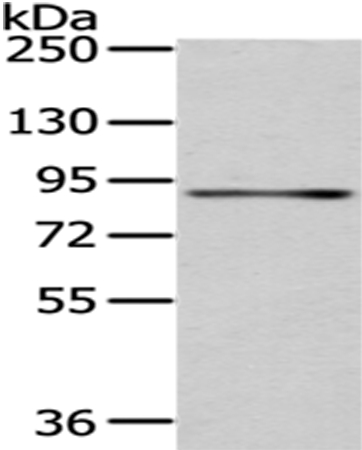
| WB | 咨询技术 | Human,Mouse,Rat |
| IF | 咨询技术 | Human,Mouse,Rat |
| IHC | 1/25-1/100 | Human,Mouse,Rat |
| ICC | 技术咨询 | Human,Mouse,Rat |
| FCM | 咨询技术 | Human,Mouse,Rat |
| Elisa | 咨询技术 | Human,Mouse,Rat |
| Aliases | FACT; T160; FACT80 |
| Entrez GeneID | 6749; |
| WB Predicted band size | 81kDa |
| Host/Isotype | Rabbit IgG |
| Antibody Type | Primary antibody |
| Storage | Store at 4°C short term. Aliquot and store at -20°C long term. Avoid freeze/thaw cycles. |
| Species Reactivity | Human |
| Immunogen | Fusion protein of human SSRP1 |
| Formulation | Purified antibody in PBS with 0.05% sodium azide. |
+ +
以下是关于SSRP1抗体的3篇参考文献,按文献名称、作者和摘要内容简要概括:
---
1. **文献名称**:*The FACT complex interacts with the histone H3 N-terminal tail to promote nucleosome stability*
**作者**:VanDemark, A.P. et al.
**摘要**:本研究利用SSRP1抗体通过免疫共沉淀(Co-IP)和染色质免疫沉淀(ChIP)技术,证实SSRP1作为FACT复合体的关键亚基,参与维持核小体稳定性,并调控转录延伸过程中组蛋白H3的动态变化。
---
2. **文献名称**:*SSRP1 facilitates tumor progression by regulating cancer stem cell properties in hepatocellular carcinoma*
**作者**:Li, Y. et al.
**摘要**:通过Western blot和免疫组化(IHC)使用SSRP1抗体,研究发现SSRP1在肝癌组织中高表达,并通过调控癌症干细胞相关基因(如OCT4、NANOG)促进肿瘤进展,提示其作为潜在治疗靶点。
---
3. **文献名称**:*The role of SSRP1 in DNA damage response and genomic instability*
**作者**:Garcia, H. et al.
**摘要**:利用SSRP1抗体进行免疫荧光和流式细胞术分析,发现SSRP1缺失导致DNA损伤修复缺陷,并加剧基因组不稳定性,揭示了其在维持DNA复制完整性中的关键作用。
---
如需具体DOI或补充更多文献,请进一步说明!
The SSRP1 (Structure-Specific Recognition Protein 1) antibody is a tool used to detect and study the SSRP1 protein, a key component of the FACT (Facilitates Chromatin Transcription) complex. SSRP1. along with SUPT16H, forms the FACT heterodimer, which plays a critical role in chromatin remodeling by binding to histones and destabilizing nucleosome structure during transcription, replication, and DNA repair. SSRP1 contains an N-terminal domain involved in histone interactions and a C-terminal HMG (High Mobility Group) box domain that recognizes DNA structural distortions, enabling FACT to act as a histone chaperone.
SSRP1 antibodies are widely utilized in research to investigate its expression, localization, and function in cellular processes. Dysregulation of SSRP1 is linked to cancer progression, as overexpression is observed in malignancies like colorectal, breast, and liver cancers, often correlating with poor prognosis. These antibodies are essential in techniques such as Western blotting, immunofluorescence, and chromatin immunoprecipitation (ChIP) to explore SSRP1's role in gene regulation, DNA damage response, and epigenetic modifications.
Additionally, SSRP1 antibodies help elucidate its involvement in stem cell pluripotency and cellular reprogramming. Studies using these reagents have revealed SSRP1's interaction with transcription factors and RNA polymerase II, highlighting its importance in maintaining genome stability and facilitating transcriptional elongation. As a biomarker and potential therapeutic target, SSRP1 continues to be a focus in oncology and molecular biology research.
×